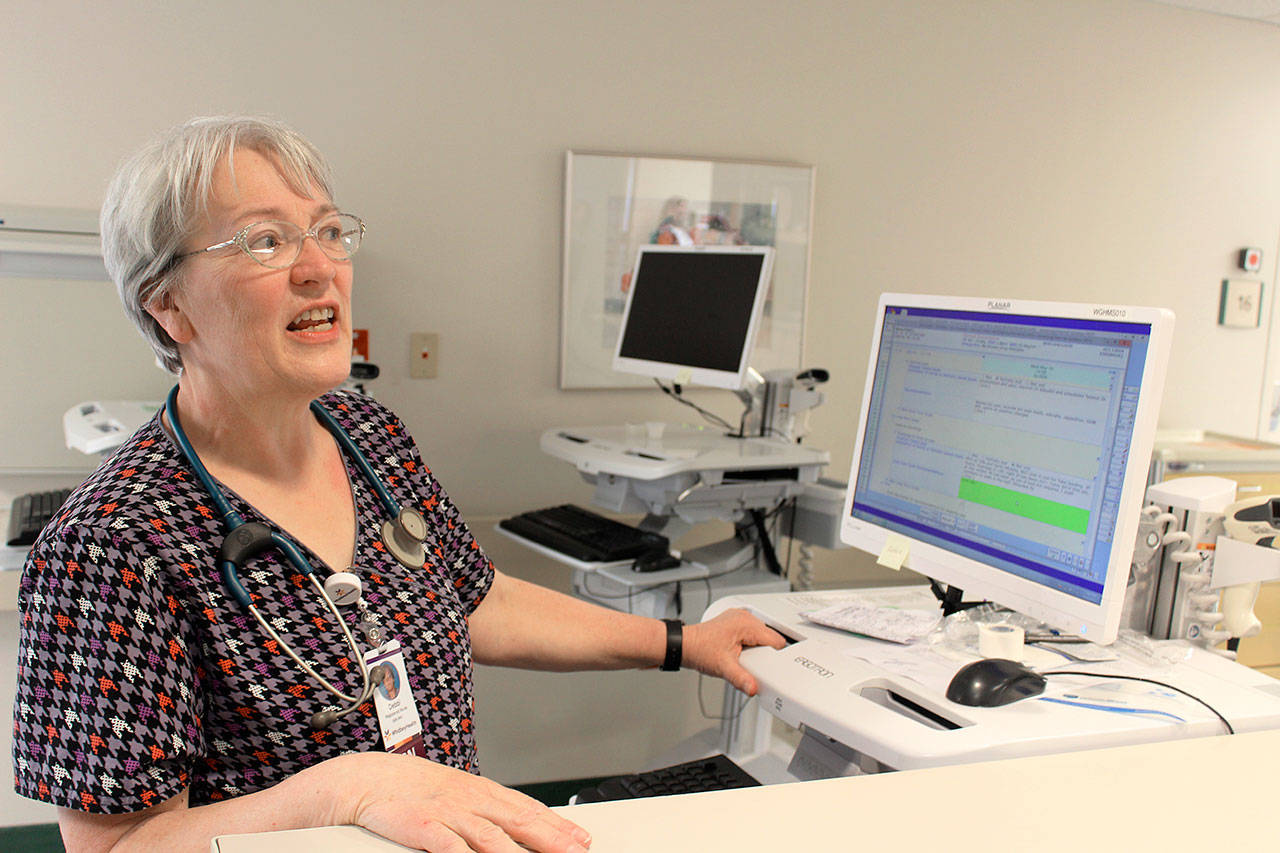Registered nurse Deborah Armstrong remembers the hospital in which she’s worked nearly four decades by listing off the various additions built over the years.
“This was it,” she said, standing in the hall of the medical-surgical wing, where she assists patients before and after surgery.
“This was Whidbey General Hospital when I first came here in 1977. Emergencies, labor and delivery, everything came through the main front doors.”
The doors now lead to a lobby, gift shop, in-patient rooms, emergency department, specialty clinics and a labor and delivery area.
Designed in 1967, the hospital opened in 1970.
Next up for change is Armstrong’s own unit. After the new 39-bed patient wing opens this summer, the medical-surgical unit will be renovated into a more modern space for pre-and-post surgical patients.
The renovation is part of the $50 million building bond taxpayers approved in 2013.
Armstrong is one of two long-time employees at WhidbeyHealth recently spotlighted during a week of staff appreciation; Barbara Johnson, a quality review analyst hired in 1980, was also recognized.
On WhidbeyHealth’s nearly 800-person staff are 18 people who’ve worked there at least 30 years, another 18 people who’ve been on board 25 years and 20 who’ve clocked in for 20 years. And 50 employees have reached the 15-year mark.
Because National Nurses Week and Hospital Week fell on the same week this year, CEO Geri Forbes decided to combine the two into one celebration called Healthcare Week. Many success stories of the organization’s employees were featured. Wednesday, the staff posed for a very large group shot outside the hospital as panoramic photographer Denis Hill snapped images using a camera on a very tall stick.
Hiring good people to work at WhidbeyHealth requires more offense than defense, says Chief Human Resource Officer Cindy Paget.
“Instead of post and pray, what we do different is dig and dive,” Paget said, explaining how she fills staff positions within the non-profit public health care system. “We use networking resume databases and get the information out to the people we think would be a good fit.
“We let them know about the island and the communities here. We basically strive to sell them on the outdoor activities and what a really nice family life can be found here.”
It’s not unusual for medical systems to have dozens of unfilled positions at any given time, Paget said.
Currently, there’s 874 positions at WhidbeyHealth and about 800 employees, Paget said. More than half of those people work full time.
“We usually run about 80 to 100 positions open at any time. Some are on-call positions, others part time.”
Paget was hired two years ago after Geri Forbes came on board as chief executive officer. So many positions needed to be filled, Paget added a second recruiter by training a person already on staff.
In 2015, 173 people were hired at WhidbeyHealth; last year, 182 people filled jobs. At the start of 2016, the fill rate was 89 percent; it’s now 92 percent.
Paget’s aim: 95 percent of the vacancies filled.
“The better you fill the rate, the better your patient care,” she said.
Holes remain in specialized areas, such as psychology and psychiatry. Recently, privileges were approved for a psychologist to practice at WhidbeyHealth Medical Center, which is the first step before one can be hired.
Later this week, long-distance consultation with a psychiatrist is to begin as a pilot project called Tele-Psych at the Freeland clinic. About 90 percent of turnover is related to the military, mostly because of a family member transfer, Paget said.
It’s not hard selling the scenery, the salary or benefits to replace staff, she said.
“We don’t have a problem attracting people because of our salaries,” Paget claimed. “WhidbeyHealth has always been very fair and very generous” with vacation, days off and holidays.
Most of the new hires are young parents looking for a nice quiet place to raise elementary-school children or they are older and tired of city life, commuting, crime and other urban woes.
Juggling staff scheduling and seniority isn’t easy.
For example, experience is a must for nurses working in operating rooms. And it’s preferable to have the most experienced doctors and staff on duty at night in the emergency department because that’s when the more critical cases come in.
However, after a certain amount of time on that tiresome shift, staff want to transfer to days.
“At a critical access hospital like ours, we need really skilled people at night in the E.R.,” she said.
One requirement of a critical care access hospital is having a certain amount of professional staff on duty, such as two registered nurses always on shift in labor and delivery.
Paget’s challenge is balancing staff requirements with the bottom line. She also must maintain employee morale for the long-time staffers while always searching for the next new hire. That’s why, she says, she proactively “digs and dives” instead of waiting to post a job and pray the right person comes along.
It seems to be working, so to speak.
“Several employees that weren’t looking who we told about Whidbey and the new hospital wing are now here,” she pointed out.
“It is a wonderful setting and not every town with a hospital is like that.”



